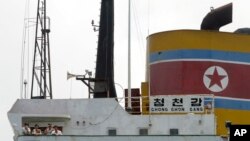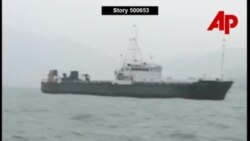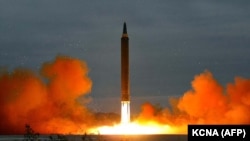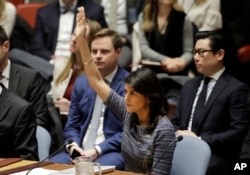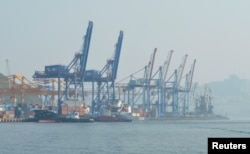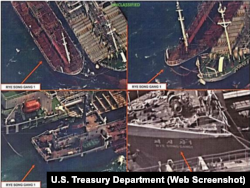On January 17, U.S. President Donald Trump and U.S. Secretary of State Rex Tillerson accused Russia of not complying with international sanctions the U.N. Security Council imposed on North Korea for its repeated nuclear and missile tests violating U.N. resolutions.
“Russia is not helping us at all with North Korea. What China is helping us with, Russia is denting. In other words, Russia is making up for some of what China is doing,” Trump said.
Intelligence agencies warn that North Korea is on the cusp of acquiring the capability of delivering a nuclear-tipped missile to the U.S. mainland, despite the most stringent sanctions to date aimed at crippling Pyongyang’s nuclear and missile programs and inducing it to de-nuclearize.
Tillerson was more direct in the allegations, saying: “It’s apparent to us that they’re not implementing all the sanctions and there’s some evidence they may be frustrating some of the sanctions.” He singled out Russia’s non-compliance as it relates to North Korea’s fuel imports.
North Korea is reportedly using trade revenues to develop its nuclear and missile program.
Rejecting the U.S. accusations that Russia is not complying with the sanctions on North Korea, Russian Deputy Foreign Minister Morgulov said the U.N. has not presented such allegations to Russia.
The U.N. Security Council imposed the latest sanctions on North Korea in December 2017 after Pyongyang test-fired its most powerful intercontinental ballistic missile yet in November. Dubbed Hwasong 15, the missile reportedly can reach U.S. mainland with a nuclear payload.
The sanctions targeted North Korea’s energy imports, labor exports, and cross-border smuggling, among other areas, but fell short of imposing a total ban on oil exports and a broader freeze on Pyongyang’s global assets, something the United States has sought.
Imports of diesel and kerosene are now capped at 500,000 barrels a year, while crude oil imports are capped at 4 million barrels a year. U.N. member states are required “to seize, inspect and freeze any vessel in their ports and territorial waters for involvement in prohibited activities,” including illicit oil imports.
Reports that Russia may be helping Pyongyang evade sanctions surfaced in late 2017. Business Insider, quoting two Western European security sources, reported in December that Russian tankers had transferred fuel to DPRK ships on at least three occasions in 2017 in an apparent effort to evade the sanctions. Pointedly, the U.N. resolution adopted in September 2017 does not appear to provide effective tools for enforcing the sanctions on the high seas.
The outlet cited a second source who said there was no evidence of Russian government involvement in the transfers. The ships allegedly had their transponders switched off as they sailed into open seas in October and November, making it impossible or extremely challenging to track their locations and presumably enabling them to complete the transfer of fuel cargo without others noticing. The owner of the Russian vessel denied any contact with the North Korean ship.
But the September 2017 U.N. resolution also emphasized that member states “shall prohibit” their nationals and entities from “facilitating or engaging in ship-to-ship transfers” to or from DPRK.
The same month, Reuters reported that at least eight North Korean ships had left Russia loaded with fuel cargo en route to North Korea in 2017 despite reporting other destinations. But it was unclear if any of the ships, later spotted in North Korean ports, actually unloaded fuel there.
U.S. Assistant Secretary of the Treasury Marshall Billingslea says that North Korea uses “deceptive practices” to conceal the origins of the cargo it imports illicitly. “Pyongyang has been found to routinely falsify a vessel’s identity and documentation,” he told Reuters.
In November 2017, the U.S. Treasury Department released images taken in October 2017 and showing Korea Kumbyol Trading Company's vessel RYE SONG GANG 1 engaging in a ship-to-ship transfer, possibly of oil, in an alleged attempt to circumvent sanctions. The Treasury could not reveal further details, but media reported that the second ship was a suspected Chinese vessel.
According to an unnamed Russian shipping source quoted by Business Insider, Russia and North Korea have been using tankers and fishing vessels for ship-to-ship transfers after discontinuing the practice of uploading fuel at ports, likely in response to the U.N. sanctions.
Polygraph.info was unable to obtain a comment from the U.S. Treasury Department, White House, or National Security Council on the U.S. evidence of alleged Russia’s non-compliance.
On January 17, the United States and more than a dozen allied nations concluded a conference in Canada on North Korean de-nuclearization, during which Tillerson urged nations to improve interdiction of ships suspected of illicit trade with North Korea so as to expand the sanctions and exert more pressure on the regime to abandon its nuclear and missile program.
While China remains the top supplier of oil products to North Korea, Russia’s trade with the DPRK across all trade items more than doubled in the first quarter of 2017, to $31.4 million.




